The compact SUV market has witnessed a significant surge in popularity, largely driven by consumers seeking a blend of practicality, style, and advanced technology. Two notable contenders in this segment are the Nissan Juke and the Volkswagen T-Cross. At first glance, these vehicles present unique characteristics that cater to different tastes and needs, yet both promise an engaging driving experience. In this comparison, we will delve into their technical aspects, innovations, and what sets them apart in this competitive landscape.
Nissan Juke vs VW T-Cross - Differences and prices compared
Compare performance (143 HP vs 150 HP), boot space and price (21400 £ vs 21400 £ ) at a glance. Find out which car is the better choice for you – Nissan Juke or VW T-Cross?
Design and Dimensions
The Nissan Juke brings its iconic, bold styling to the forefront. With a length of 4210 mm, a width of 1800 mm, and a height of 1593 mm, it projects a sporty and muscular profile that turns heads on the road. The distinctive Juke aesthetic has remained largely unchanged, maintaining its charm with unique design elements like the high-mounted headlights and curved body lines.
Contrastingly, the Volkswagen T-Cross embodies a more conventional SUV design with a slightly compact footprint, measuring 4127 mm in length, 1784 mm in width, and 1573 mm in height. Its understated yet modern look appeals to a broader audience, balancing functionality with a stylish presence.
Powertrains and Performance
When it comes to engine options, the Juke offers a diverse lineup, including petrol and a full hybrid variant. The petrol engines rage from 114 to 143 HP, delivering adequate performance for daily driving with a 0-100 km/h acceleration spread of 10.1 to 11.8 seconds. The Juke is known for its agile handling, enhanced by front-wheel drive and transmission options that include manual and dual-clutch automatic gearboxes.
On the other hand, the T-Cross boasts a range of petrol engines with power outputs ranging from 95 to a robust 150 HP. The 0-100 km/h acceleration times vary from 8.4 seconds for the top variant to 11.2 seconds for the base model. Similar to the Juke, it offers both manual and automatic transmission options and is also front-wheel drive, ensuring a pleasurable driving experience ideal for city commutes and weekend getaways.
Fuel Efficiency and Eco-Friendliness
Fuel efficiency is an imperative aspect for modern consumers, and the Nissan Juke performs admirably in this domain with consumption levels ranging from 4.7 to 6 L/100km. The hybrid variant further enhances its eco-credentials, making it a commendable choice for environmentally-conscious drivers.
The T-Cross also holds its ground with slightly higher consumption figures of 5.6 to 6 L/100km, depending on the engine choice. Both vehicles are equipped with efficient engines designed to meet contemporary emissions standards, featuring CO2 emissions hovering around the 127-135 g/km mark for the T-Cross and 107-137 g/km for the Juke. This aligns them both in the 'D' efficiency class.
Interior and Space
Inside, the Juke provides an engaging, tech-forward environment with seating for five and a trunk capacity of 422 L, exceeding the T-Cross's 455 L. The Juke's unique dashboard layout, highlighted by an advanced infotainment system, makes it a strikingly modern cabin with an emphasis on driver-centric controls.
Conversely, the T-Cross delivers a more conventional interior setup, focusing on practicality and space. With its modular seating arrangements, the T-Cross enhances passenger comfort and cargo versatility. Its clean dashboard design features a straightforward infotainment system, making it user-friendly but less emotive than the Juke's offering.
Safety Features and Innovations
Both the Juke and T-Cross boast a plethora of safety features, including multiple airbags, electronic stability control, and advanced driver-assistance systems. Nissan’s ProPILOT Assist in the Juke enhances safety through adaptive cruise control and lane-keeping assist, setting a high standard for driving aids.
Similarly, the T-Cross incorporates VW's suite of safety technologies, including Front Assist and Emergency City Braking, which contribute to its reputation for reliability and safety. Both vehicles have undergone strict safety testing, ensuring peace of mind for consumers.
Conclusion: The Choice is Yours
In summary, the Nissan Juke and VW T-Cross cater to diverse preferences in the competitive compact SUV market. The Juke stands out with its sporty design, hybrid options, and innovative features, appealing to those seeking a distinctive experience. Meanwhile, the T-Cross excels in practicality, modularity, and traditional design, catering to an audience that prioritizes utility. Ultimately, your choice will depend on your lifestyle needs, personal taste, and driving habits, making either vehicle a strong contender in its class.
Here’s where it gets real: The technical differences in detail
Costs and Efficiency:
Price and efficiency are key factors when choosing a car – and this is often where the real differences emerge.
Nissan Juke has a minimal advantage in terms of price – it starts at 21400 £ , while the VW T-Cross costs 21400 £ . That’s a price difference of around 9 £.
Fuel consumption also shows a difference: Nissan Juke manages with 4.70 L and is therefore to a small extent more efficient than the VW T-Cross with 5.40 L. The difference is about 0.70 L per 100 km.
Engine and Performance:
Under the bonnet, it becomes clear which model is tuned for sportiness and which one takes the lead when you hit the accelerator.
When it comes to engine power, the VW T-Cross has a hardly perceptible edge – offering 150 HP compared to 143 HP. That’s roughly 7 HP more horsepower.
In acceleration from 0 to 100 km/h, the VW T-Cross is noticeable quicker – completing the sprint in 8.40 s, while the Nissan Juke takes 10.10 s. That’s about 1.70 s faster.
There’s also a difference in torque: VW T-Cross pulls somewhat stronger with 250 Nm compared to 200 Nm. That’s about 50 Nm difference.
Space and Everyday Use:
Beyond pure performance, interior space and usability matter most in daily life. This is where you see which car is more practical and versatile.
Both vehicles offer seating for 5 people.
In curb weight, VW T-Cross is slight lighter – 1267 kg compared to 1274 kg. The difference is around 7 kg.
In terms of boot space, the VW T-Cross offers slight more room – 455 L compared to 422 L. That’s a difference of about 33 L.
When it comes to payload, VW T-Cross to a small extent takes the win – 480 kg compared to 427 kg. That’s a difference of about 53 kg.
Who wins the race in the data check?
The VW T-Cross has the upper hand in the objective data comparison.
This result only shows which model scores more points on paper – not which of the two cars feels right for you.
Costs and Consumption
View detailed analysis
Engine and Performance
View detailed analysis
Dimensions and Body
View detailed analysis
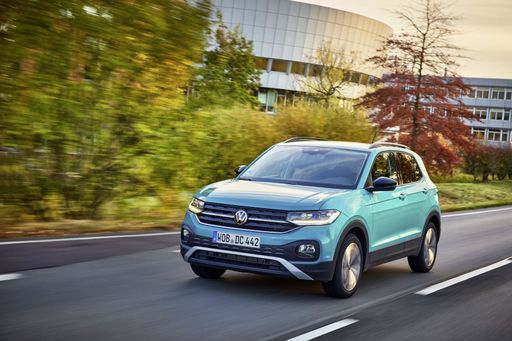
VW T-Cross
Nissan Juke
The Nissan Juke is a pocket-sized crossover that refuses to blend in, with quirky styling and a cheeky stance that turns heads at every traffic light. It’s ideal for shoppers who value personality and nimble urban driving over maximum practicality, delivering surprising pep and a well-equipped feel for everyday fun.
details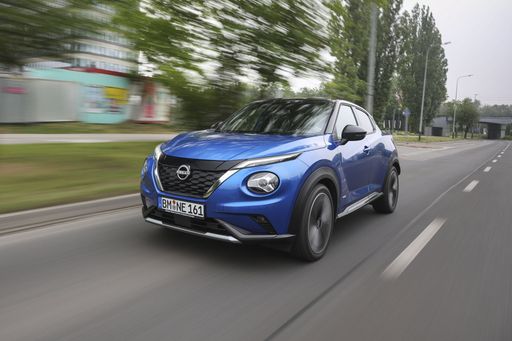
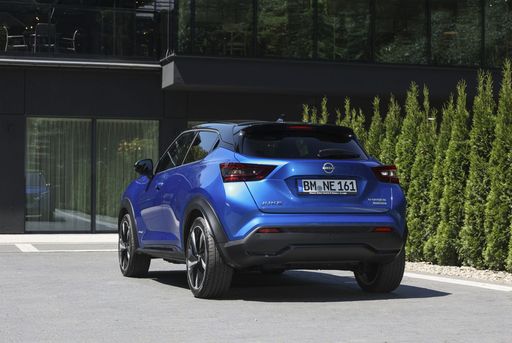
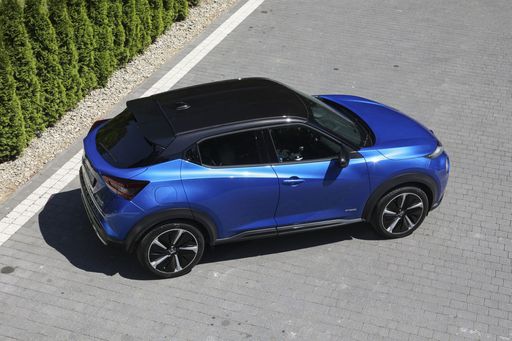

VW T-Cross
The VW T-Cross turns everyday practicality into a style statement, offering a roomy-feeling cabin, clever storage and playful design that suits town life and family duties alike. On the road it's composed and relaxed, rewarding buyers who want the raised seating and confident presence of an SUV without the weighty compromises.
details
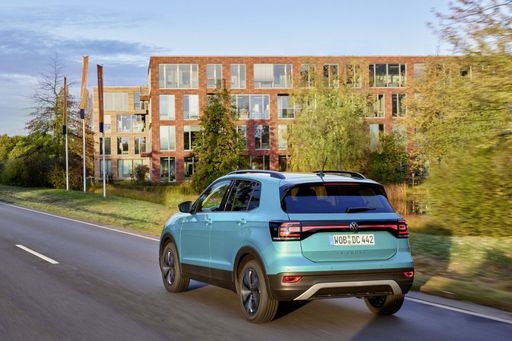
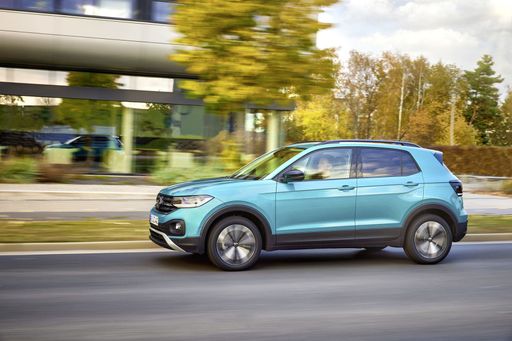
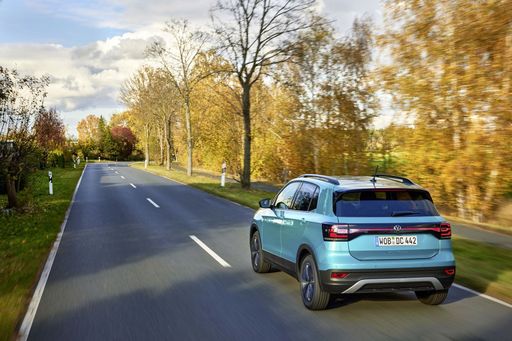
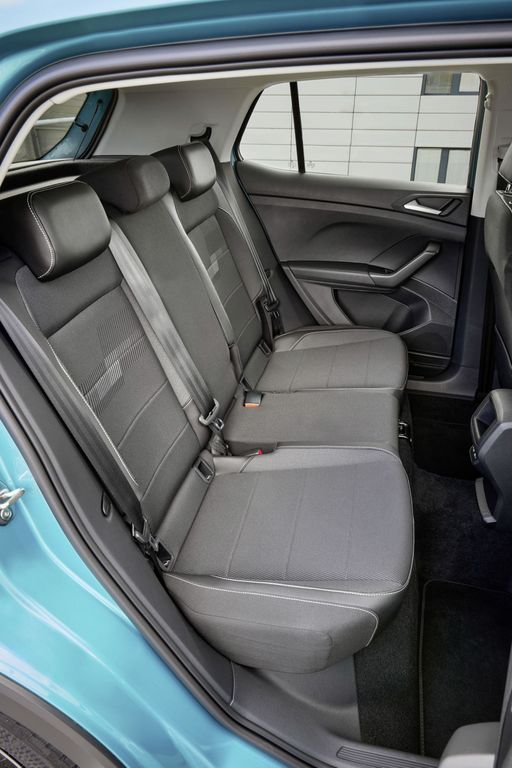
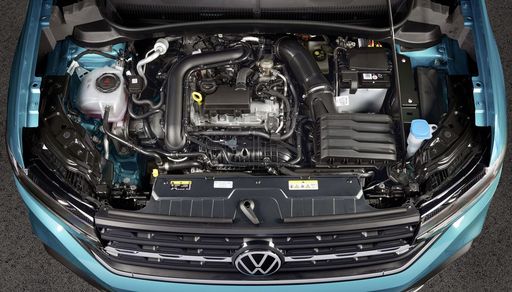
Costs and Consumption |
|
|---|---|
|
Price
21400 - 31800 £
|
Price
21400 - 32000 £
|
|
Consumption L/100km
4.7 - 6 L
|
Consumption L/100km
5.4 - 6 L
|
|
Consumption kWh/100km
-
|
Consumption kWh/100km
-
|
|
Electric Range
-
|
Electric Range
-
|
|
Battery Capacity
-
|
Battery Capacity
-
|
|
co2
105 - 136 g/km
|
co2
124 - 136 g/km
|
|
Fuel tank capacity
-
|
Fuel tank capacity
-
|
Dimensions and Body |
|
|---|---|
|
Body Type
SUV
|
Body Type
SUV
|
|
Seats
5
|
Seats
5
|
|
Doors
-
|
Doors
-
|
|
Curb weight
1274 - 1405 kg
|
Curb weight
1267 - 1338 kg
|
|
Trunk capacity
354 - 422 L
|
Trunk capacity
455 L
|
|
Length
-
|
Length
-
|
|
Width
1800 mm
|
Width
1784 mm
|
|
Height
-
|
Height
-
|
|
Max trunk capacity
-
|
Max trunk capacity
-
|
|
Payload
405 - 427 kg
|
Payload
463 - 480 kg
|
Engine and Performance |
|
|---|---|
|
Engine Type
Petrol, Full Hybrid
|
Engine Type
Petrol
|
|
Transmission
Manuel, Automatic
|
Transmission
Manuel, Automatic
|
|
Transmission Detail
Manual Gearbox, Dual-Clutch Automatic, Automatic Gearbox
|
Transmission Detail
Manual Gearbox, Dual-Clutch Automatic
|
|
Drive Type
Front-Wheel Drive
|
Drive Type
Front-Wheel Drive
|
|
Power HP
114 - 143 HP
|
Power HP
95 - 150 HP
|
|
Acceleration 0-100km/h
10.1 - 11.8 s
|
Acceleration 0-100km/h
8.4 - 11.3 s
|
|
Max Speed
-
|
Max Speed
-
|
|
Torque
200 Nm
|
Torque
175 - 250 Nm
|
|
Number of Cylinders
3 - 4
|
Number of Cylinders
3 - 4
|
|
Power kW
84 - 105 kW
|
Power kW
70 - 110 kW
|
|
Engine capacity
999 - 1598 cm3
|
Engine capacity
999 - 1498 cm3
|
General |
|
|---|---|
|
Model Year
2025
|
Model Year
2024 - 2025
|
|
CO2 Efficiency Class
D, E, C
|
CO2 Efficiency Class
D, E
|
|
Brand
Nissan
|
Brand
VW
|
What drive types are available for the Nissan Juke?
Available configurations include Front-Wheel Drive.
